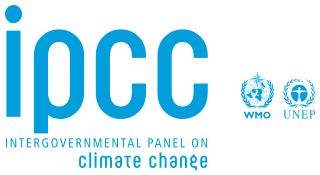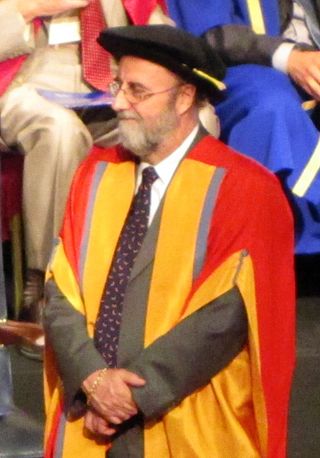Related Research Articles

Climate is the long-term weather pattern in a region, typically averaged over 30 years. More rigorously, it is the mean and variability of meteorological variables over a time spanning from months to millions of years. Some of the meteorological variables that are commonly measured are temperature, humidity, atmospheric pressure, wind, and precipitation. In a broader sense, climate is the state of the components of the climate system, including the atmosphere, hydrosphere, cryosphere, lithosphere and biosphere and the interactions between them. The climate of a location is affected by its latitude, longitude, terrain, altitude, land use and nearby water bodies and their currents.

The Intergovernmental Panel on Climate Change (IPCC) is an intergovernmental body of the United Nations. Its job is to advance scientific knowledge about climate change caused by human activities. The World Meteorological Organization (WMO) and the United Nations Environment Programme (UNEP) set up the IPCC in 1988. The United Nations endorsed the creation of the IPCC later that year. It has a secretariat in Geneva, Switzerland, hosted by the WMO. It has 195 member states who govern the IPCC. The member states elect a bureau of scientists to serve through an assessment cycle. A cycle is usually six to seven years. The bureau selects experts in their fields to prepare IPCC reports. There is a formal nomination process by governments and observer organizations to find these experts. The IPCC has three working groups and a task force, which carry out its scientific work.

Sir Robert Tony Watson CMG FRS is a British chemist who has worked on atmospheric science issues including ozone depletion, global warming and paleoclimatology since the 1980s. Most recently, he is lead author of the February 2021 U.N. report Making Peace with Nature.

Bert Rickard Johannes Bolin was a Swedish meteorologist who served as the first chairman of the Intergovernmental Panel on Climate Change (IPCC), from 1988 to 1997. He was professor of meteorology at Stockholm University from 1961 until his retirement in 1990.

There is a nearly unanimous scientific consensus that the Earth has been consistently warming since the start of the Industrial Revolution, that the rate of recent warming is largely unprecedented, and that this warming is mainly the result of a rapid increase in atmospheric carbon dioxide (CO2) caused by human activities. The human activities causing this warming include fossil fuel combustion, cement production, and land use changes such as deforestation, with a significant supporting role from the other greenhouse gases such as methane and nitrous oxide. This human role in climate change is considered "unequivocal" and "incontrovertible".

The World Climate Research Programme (WCRP) is an international programme that helps to coordinate global climate research. The WCRP was established in 1980, under the joint sponsorship of the World Meteorological Organization (WMO) and the International Council for Science (ICSU), and has also been sponsored by the Intergovernmental Oceanographic Commission (IOC) of UNESCO since 1993.
The Summary for policymakers (SPM) is a summary of the Intergovernmental Panel on Climate Change (IPCC) reports intended to aid policymakers. The form is approved line by line by governments: "Negotiations occur over wording to ensure accuracy, balance, clarity of message, and relevance to understanding and policy."

Sir John Theodore Houghton was a Welsh atmospheric physicist who was the co-chair of the Intergovernmental Panel on Climate Change's (IPCC) scientific assessment working group which shared the Nobel Peace Prize in 2007 with Al Gore. He was lead editor of the first three IPCC reports. He was professor in atmospheric physics at the University of Oxford, former Director General at the Met Office and founder of the Hadley Centre.

The IPCC Third Assessment Report (TAR), Climate Change 2001, is an assessment of available scientific and socio-economic information on climate change by the IPCC. Statements of the IPCC or information from the TAR were often used as a reference showing a scientific consensus on the subject of global warming. The Third Assessment Report (TAR) was completed in 2001 and consists of four reports, three of them from its Working Groups: Working Group I: The Scientific Basis; Working Group II: Impacts, Adaptation and Vulnerability; Working Group III: Mitigation; Synthesis Report. A number of the TAR's conclusions are given quantitative estimates of how probable it is that they are correct, e.g., greater than 66% probability of being correct. These are "Bayesian" probabilities, which are based on an expert assessment of all the available evidence.

The Second Assessment Report (SAR) of the Intergovernmental Panel on Climate Change (IPCC), published in 1995, is an assessment of the then available scientific and socio-economic information on climate change. The report was split into four parts: a synthesis to help interpret UNFCCC article 2, The Science of Climate Change, Impacts, Adaptations and Mitigation of Climate Change, Economic and Social Dimensions of Climate Change. Each of the last three parts was completed by a separate Working Group (WG), and each has a Summary for Policymakers (SPM) that represents a consensus of national representatives.
Donna Laframboise is a Canadian investigative journalist, writer, and photographer. She has published critical reviews of the Intergovernmental Panel on Climate Change and its reports for the United Nations.
Yuri Antonievich Izrael was a Soviet and Russian meteorologist. He served as the vice-chairman of the Intergovernmental Panel on Climate Change (IPCC) until September 2008, when the new bureau was elected. He was the "most influential scientific adviser" for Vladimir Putin, the president of Russia, according to CNN.

The Fifth Assessment Report (AR5) of the United Nations Intergovernmental Panel on Climate Change (IPCC) is the fifth in a series of such reports and was completed in 2014. As had been the case in the past, the outline of the AR5 was developed through a scoping process which involved climate change experts from all relevant disciplines and users of IPCC reports, in particular representatives from governments. Governments and organizations involved in the Fourth Report were asked to submit comments and observations in writing with the submissions analysed by the panel. Projections in AR5 are based on "Representative Concentration Pathways" (RCPs). The RCPs are consistent with a wide range of possible changes in future anthropogenic greenhouse gas emissions. Projected changes in global mean surface temperature and sea level are given in the main RCP article.
Harry F. Lins is a retired hydrologist whose career was spent with the U.S. Geological Survey from 1971 to 2012. During his years at USGS, his work spanned several Earth science disciplines, including coastal processes, surface water hydrology, and hydroclimatology. Although most of his career was spent conducting research, he managed the USGS Global Change Hydrology Program from 1989 to 1997, and served as co-chair of the Intergovernmental Panel on Climate Change (IPCC) Hydrology and Water Resources Working Group for the IPCC First Assessment Report. As a result of his IPCC work, he shared in award of the Nobel Peace Prize to the IPCC in 2007. In 1999, he and USGS colleague David Wolock developed "WaterWatch", the Nation's first website depicting maps and graphs of water resources conditions in near real-time. Lins served as President of the World Meteorological Organization (WMO) Commission for Hydrology from 2012 to 2019.
Julie Michelle Arblaster is an Australian scientist. She is a Professor in the School of Earth, Atmosphere and Environment at Monash University. She was a contributing author on reports for which the Intergovernmental Panel on Climate Change (IPCC) was a co-recipient of the 2007 Nobel Peace Prize. Arblaster was a lead author on Chapter 12 of the IPCC Working Group I contribution to the IPCC Fifth Assessment Report in 2013. She has received the 2014 Anton Hales Medal for research in earth sciences from the Australian Academy of Science, and the 2017 Priestley Medal from the Australian Meteorological and Oceanographic Society. She has been ranked as one of the Top Influential Earth Scientists of 2010-2020, based on citations and discussion of her work.
Venkatachalam Ramaswamy is the Director of the Geophysical Fluid Dynamics Laboratory of the National Oceanic and Atmospheric Administration (NOAA) Office of Oceanic and Atmospheric Research (OAR), studying climate modeling and climate change. "A leading climate scientist", his work is cited as supporting evidence for significant stratospheric climate change. He focuses in particular on radiative transfer models and the hydrologic cycle in the atmosphere. He has actively supported the development of supercomputing approaches that enable researchers to achieve higher resolution and greater complexity in climate models. As a lead author involved in the Intergovernmental Panel on Climate Change (IPCC), Ramaswamy's contributions was recognised by the joint award of the 2007 Nobel Peace Prize to the IPCC.

Opha Pauline Dube is a Botswanan environmental scientist and Associate Professor in the Department of Environmental Science at the University of Botswana. She co-authored the IPCC's Special Report on Global Warming of 1.5 °C. She is one of fifteen scientists creating the 2023 Global Sustainable Development Report for the United Nations.
Lisa Victoria Alexander is an international expert on heatwaves. She received the Dorothy Hill Medal for her research on climate extremes, the frequency and intensity of heatwaves, and has provided evidence that the frequency and intensity of heatwaves will be influenced by the quantity of anthropogenic greenhouse gas emissions, in particular carbon dioxide. She was a contributing author to the Intergovernmental Panel on Climate Change (IPCC) reports, including the fifth assessment report.

Ronald J. Stouffer is a meteorologist and adjunct professor at the University of Arizona, formerly Senior Research Climatologist and head of the Climate and Ecosystems Group at the Geophysical Fluid Dynamics Laboratory (GFDL), part of NOAA. He has also served on the faculty of Princeton University.
References
- ↑ John Zillman, Some Parting Thoughts, ATSE Focus, 2006 Archived 2007-09-21 at the Wayback Machine
- ↑ John Zillman, The Intergovernmental Panel on Climate Change, ATSE Focus, 2006 Archived 2007-09-21 at the Wayback Machine
- ↑ "Winners of the IMO Prize". World Meteorological Organization. Archived from the original on 22 November 2015. Retrieved 8 December 2015.
- ↑ John Zillman, Climate Change: A Natural Hazard?, 22 November 2004 Archived 8 December 2004 at the Wayback Machine